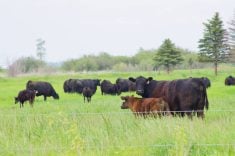NANTON, Alta. Ñ The first time Susan White saw a goat faint she called her vet, convinced something was wrong. He laughed and told her she had a fainting goat. A goat enthusiast who has owned several breeds, White has since become a dedicated breeder of these rare animals on her Faint Hope Acres farm near Nanton.
“In Canada we are not as advanced as the U.S. is with this breed of goat,” she said. “People here tend to think of them as a joke.”
There are fewer than 10,000 purebred fainting goats in the world. Six months ago they were placed on the critical list with Rare Breeds Canada, a registered conservancy for rare livestock and poultry species. She raises the goats as pets and finds they are easy to manage around children and do not try to escape their pens like some breeds. She has 14 does and two adult bucks with plans to expand the herd to 20. Kids are born in early spring and fall.
Read Also

House ag committee to undertake several studies
The House of Commons standing agriculture committee has set its agenda for the coming months. Members began the fall sitting with a two-hour update on international trade
Word of mouth, newspaper advertising and internet chat rooms put her in touch with other breeders who want to conserve the breed and increase its numbers.
She is constantly on the lookout for other breeders and has contacted people in Alberta, Manitoba and Saskatchewan as well as the United States, where three large shows are held annually.
She has imported animals from the U.S. but lost this valuable source of genetics two years ago when BSE closed the border to ruminant trade. “We were pretty disheartened about that because the gene pool for these goats is very limited.”
White estimated that fewer than 50 goats are registered in Canada with the international registry. “It is so important that people start registering them here,” she said.
The International Fainting Goat Association recognizes two strains found mostly in Tennessee and the eastern U.S. Some refer to them as Tennessee meat goats or wooden leg goats.
The herd book is open, recognizing goats with the stiffening quality that don’t fall over, as well as those that fall over completely. Pictures in the standing and down positions must accompany the registration.
When White looks for new goats, she demands valid registration papers and pedigrees. “Just because a goat falls over, people are assuming it is a fainting goat and that is not true,” she said.
Registered shows aren’t held in Canada and White doesn’t put them on public display because of disease concerns for such a rare breed. New goats coming onto the farm are kept in quarantine for eight to 10 weeks to rule out potential disease.
Known as myotonic goats, a recessive gene causes their muscles to stiffen, causing them to fall over when they are startled or frightened. They do not lose consciousness and do not appear upset when they topple over.
No one is sure of their origin but some believe the breed emerged from a private herd in Tennessee around 1880. John Tinsley arrived there with three does and a buck from Nova Scotia. He moved on and left the goats behind. It is believed fainting goats descended from this small herd, while others speculate they resulted from a spontaneous gene mutation.
They appear in all colours, produce plenty of milk and are well muscled, making them a good cross with meat goats. They do not necessarily pass on the fainting trait. The goats have distinctive facial features with unique bone development around the eyes. They also have large horns that spiral as they grow out and back.

















